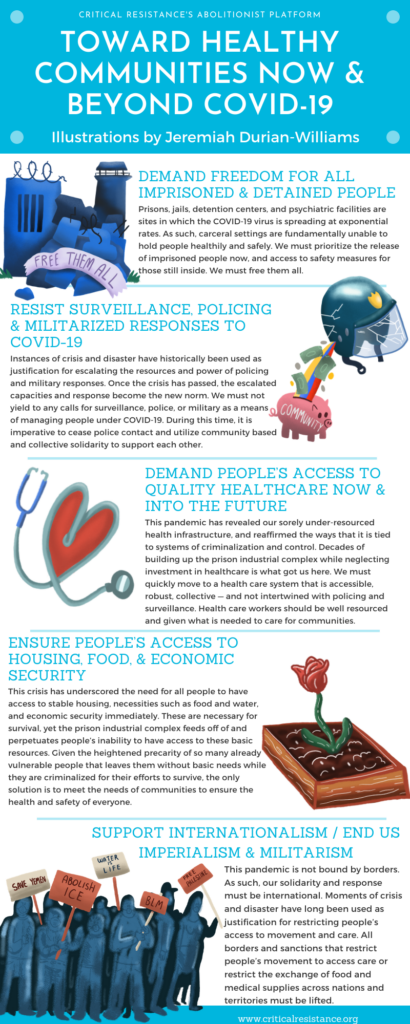This site lays out a platform for COVID-19 emergency response in a way that supports freedom, health, and collective care, and actively resists the prison industrial complex in all its forms.
As COVID-19 spreads around the country, abolitionists grow increasingly alarmed at the ways that this new development is impacting our loved ones connected to the prison industrial complex (PIC). Locked facilities are already toxic environments; exposing those inside to poor and crowded living conditions and lack of care. There is a long history of epidemics and diseases spreading throughout prison and jail systems with little recourse or relief. We know that during times of crisis, the PIC builds up its capacity and often expands – while communities most marginalized are left behind. They are the last to receive relief both inside and out of prison. They have escalated experiences of harm due to more frequent police contact and expanded police power. They are more likely to be targeted due to heightened surveillance.
Decades of organizing to end the prison industrial complex has prepared us and our movements for liberation to respond to the COVID-19 emergency with a focus on putting people’s immediate well-being first, tapping into communities’ knowledges about how to build structures for support and mutual aid, and moving forward with a vision for long-term building. As abolitionists, we believe that social structures, both formal and informal, need to support people’s lives and ability to live. We also believe that policing, imprisonment, and surveillance do not, and cannot, ensure safety or create opportunities for care. As a severe public health crisis, the COVID-19 pandemic has necessitated abolitionist demands and practices as the most common sense and practical steps to ensure that we are as strong and healthy as possible.
The abolition of the prison industrial complex is about dismantling cages and oppressive structures while building up the resources, practices, and institutions that support healthy and self-determined communities. It requires all of us. As Ruthie Gilmore noted during Los Angeles for Abolition: Dismantling Jails and Building Liberation (Sept. 2019), “abolition is a practical program of radical change cobbled together from the work that people do in disparate struggles every day.”
We are seeing this already in the massive movements to share resources, look out for each other, and build networks and structures for care across cities and towns, neighborhoods, and virtual communities. Here, we uplift calls for life-saving measures to address the needs of prisoners and loved ones, people facing housing and food insecurity – long term or with the loss of work now, and people who are targeted for arrest and detention. These are real, clear, and concrete steps for stemming the pandemic now among millions of the most vulnerable and changing the social and political structures that guarantee that vulnerability.
How we address this crisis will determine what our society looks like after it passes. We are committed to seeding a more abolitionist future.






